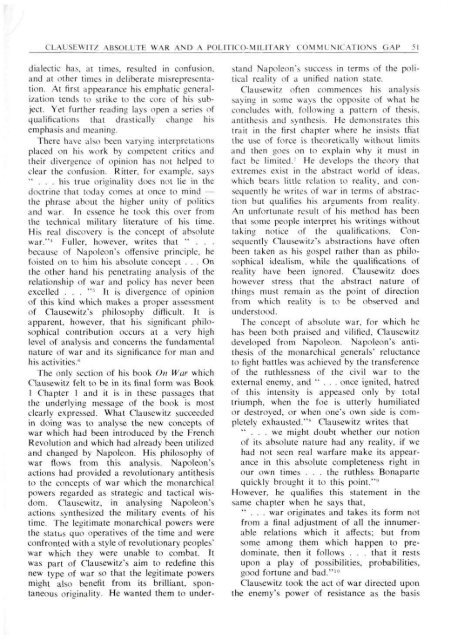ISSUE 3 : Mar/Apr - 1977 - Australian Defence Force Journal
ISSUE 3 : Mar/Apr - 1977 - Australian Defence Force Journal
ISSUE 3 : Mar/Apr - 1977 - Australian Defence Force Journal
Create successful ePaper yourself
Turn your PDF publications into a flip-book with our unique Google optimized e-Paper software.
(LUSfWII/ ABSOLUTE WAR AM) A POLITIC O-MII IT AR V COM M I NIC ATIONS CAP 51dialectic has, at times, resulted in confusion,and at other times in deliberate misrepresentation.At first appearance his emphatic generalizationtends to strike to the core of his subject.Yet further reading lays open a series ofqualifications that drastically change hisemphasis and meaning.There have also been varying interpretationsplaced on his work by competent critics andtheir divergence of opinion has not helped toclear the confusion. Ritter, for example, says"... his true originality does not lie in thedoctrine that today comes at once to mind -the phrase about the higher unity of politicsand war. In essence he took this over fromthe technical military literature of his time.His real discovery is the concept of absolutewar."' Fuller, however, writes that " . . .because of Napoleon's offensive principle, hefoisted on to him his absolute concept . . . Onthe other hand his penetrating analysis of therelationship of war and policy has never beenexcelled . . . " 5 It is divergence of opinionof this kind which makes a proper assessmentof Clausewitz's philosophy difficult. It isapparent, however, that his significant philosophicalcontribution occurs at a very highlevel of analysis and concerns the fundamentalnature of war and its significance for man andhis activities. 6The only section of his book On War whichClausewitz felt to be in its final form was Book1 Chapter 1 and it is in these passages thatthe underlying message of the book is mostclearly expressed. What Clausewitz succeededin doing was to analyse the new concepts ofwar which had been introduced by the FrenchRevolution and which had already been utilizedand changed by Napoleon. His philosophy ofwar flows from this analysis. Napoleon'sactions had provided a revolutionary antithesisto the concepts of war which the monarchicalpowers regarded as strategic and tactical wisdom.Clausewitz. in analysing Napoleon'sactions synthesized the military events of histime. The legitimate monarchical powers werethe status quo operatives of the time and wereconfronted with a style of revolutionary peoples'war which they were unable to combat. Itwas part of Clausewitz's aim to redefine thisnew type of war so that the legitimate powersmight also benefit from its brilliant, spontaneousoriginality. He wanted them to understandNapoleon's success in terms of the politicalreality of a unified nation state.Clausewitz often commences his analysissaying in some ways the opposite of what heconcludes with, following a pattern of thesis,antithesis and synthesis. He demonstrates thistrait in the first chapter where he insists thatthe use of force is theoreticalh without limitsand then goes on to explain why it must infact be limited. 7 He develops the theory thatextremes exist in the abstract world of ideas,which bears little relation to reality, and consequentlyhe writes of war in terms of abstractionbut qualifies his arguments from reality.An unfortunate result of his method has beenthat some people interpret his writings withouttaking notice of the qualifications. ConsequentlyClausewitz's abstractions have oftenbeen taken as his gospel rather than as philosophicalidealism, while the qualifications ofreality have been ignored. Clausewitz doeshowever stress that the abstract nature ofthings must remain as the point of directionfrom which reality is to be observed andunderstood.The concept of absolute war, for which hehas been both praised and vilified, Clausewitzdeveloped from Napoleon. Napoleon's antithesisof the monarchical generals' reluctanceto fight battles was achieved by the transferenceof the ruthlessness of the civil war to theexternal enemy, and "... once ignited, hatredof this intensity is appeased only by totaltriumph, when the foe is utterly humiliatedor destroyed, or when one's own side is completelyexhausted." 8 Clausewitz writes that"... we might doubt whether our notionof its absolute nature had any reality, if wehad not seen real warfare make its appearancein this absolute completeness right inour own times . . . the ruthless Bonapartequickly brought it to this point.""However, he qualifies this statement in thesame chapter when he says that,"... war originates and takes its form notfrom a final adjustment of all the innumerablerelations which it affects: but fromsome among them which happen to predominate,then it follows . . . that it restsupon a play of possibilities, probabilities,good fortune and bad." 10Clausewitz took the act of war directed uponthe enemy's power of resistance as the basis
















